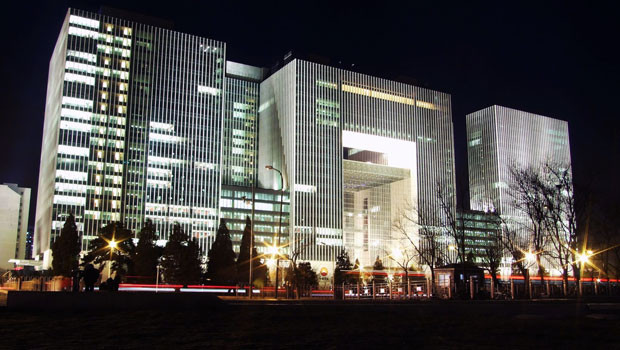Asia report: Stocks tumble as oil reaches 14-year highs

Stock markets in Asia slid across the board on Monday, leading what looked set to be a global day of declines, as oil prices hit levels not seen since the financial crisis 14 years ago.
In Japan, the Nikkei 225 was down 2.94% at 25,221.41, as the yen weakened 0.2% against the dollar to last trade at JPY 115.05.
It was a day of slides for the usual suspects on the benchmark index, with automation specialist Fanuc tumbling 7.72%, fashion firm Fast Retailing slipping 0.95%, and technology conglomerate SoftBank Group down 5.16%.
Energy stocks went against the trend as the Ukraine invasion saw the unfettered rise in oil prices continue, with Inpex up 6.81% and Japan Petroleum Exploration ahead 3.94%.
The broader Topix index was off 2.76% by the end of trading in Tokyo, closing at 1,794.03.
On the mainland, the Shanghai Composite was 2.17% lower at 3,372.86, and the smaller, technology-heavy Shenzhen Composite was 2.7% weaker at 2,203.41.
Official data released earlier showed China’s exports growing 16.3% year-on-year on a dollar-denominated basis over the January-February period, beating Reuters-polled expectations for a 15% improvement.
That came on the back of the politburo’s latest economic targets set on Saturday, with the annual National Congress in Beijing saying it expected gross domestic product to grow around 5.5% in China in 2022.
“For the first time, the authorities have opted not to publish separate January and February trade data, instead printing just a combined, cumulative figure for both months,” said Pantheon Macroeconomics chief China economist Craig Botham.
“This is similar to the way other data are already handled to deal with Lunar New Year distortions, but it does complicate the analysis slightly.
“Treating the cumulative growth rates as an average for the two months, we estimate that the trade balance fell to $42.5bn in February, from $73.4bn in January, itself a drop from $94.5bn in December.”
Botham said that was likely more than a statistical artefact, as Pantheon had expected that China’s surpluses would erode in 2022.
“Growth rates will inevitably be lower than last year, given high base effects, but the surplus itself will also decline as consumption moves back to services, and away from goods, and as competitors ramp up production and fight for their old market share.”
South Korea’s Kospi dropped 2.29% to 2,651.31, while the Hang Seng Index in Hong Kong tumbled 3.87% to 21,057.63.
Stocks in the special administrative region were led lower by Anglo-Asian banking giant HSBC, which were down 7.09% at the close.
Chinese state-affiliated oil play PetroChina, on the other hand, saw its Hong Kong shares close 4.44% firmer.
Seoul’s blue-chip technology stocks were well below the waterline, with Samsung Electronics down 1.96% and SK Hynix losing 4.02%.
Oil prices continued their unabated surges upwards at the end of the Asian day, with Brent crude last up 6.6% at $125.90 per barrel, and West Texas Intermediate rising 6.43% to $123.12.
Brent futures had briefly broken the $139 per barrel level earlier, making for the highest prices since July 2008, at the height of the global financial crisis.
The fresh spikes came after US Secretary of State Anthony Blinken said on Sunday that Western allies were considering banning imports of Russian oil and natural gas.
“It’s hard to see much in the way of significant upside for stock markets now against a backdrop of continued escalation and raise the question of how much further Putin is prepared to go to achieve his goals,” said CMC Markets chief market analyst Michael Hewson of the global situation on Monday morning, as Russia’s unprovoked and violent invasion of Ukraine continued.
“With little sign that he is inclined to back down, pushing up against the stubbornness of Ukrainian forces in acquiescing to his demands, investors are likely to find themselves tested further in the coming days, with the only certainty being more volatility.
“These tests for markets are likely to cover scenarios from Russia adopting a scorched earth policy, to further atrocities against civilians, to threats of nuclear escalation, when it becomes apparent that he won’t achieve his goals quickly, and in the process ensuring that Russia slowly turns into the North Korea of Europe.”
That in turn was likely to mean that sanctions would fall on oil and gas imports from Russia, Hewson noted, with reports over the weekend suggesting that the United States was open to a total ban on Russian oil, although Europe was more reluctant given its heavier reliance on energy imports from the east.
“Nonetheless this news has prompted oil prices to surge even further this morning sending Brent crude prices above $130 a barrel, and in turn seen markets in Asia slide sharply as concerns over demand destruction and a global recession increase.”
In Australia, the S&P/ASX 200 was off 1.02% at 7,038.60, with oil plays lifting the energy subindex 5.25% higher in Sydney.
Beach Energy was ahead 6.31%, and Woodside Petroleum surged 9.52%.
Across the Tasman Sea, New Zealand’s S&P/NZX 50 was 1.88% lower at 11,913.27, with energy plays New Zealand Oil & Gas and NZ Refining both managing gains of 1% in Wellington.
The down under dollars were both stronger on the greenback, with the Aussie last ahead 0.45% at AUD 1.35, and the Kiwi advancing 0.37% to NZD 1.452.